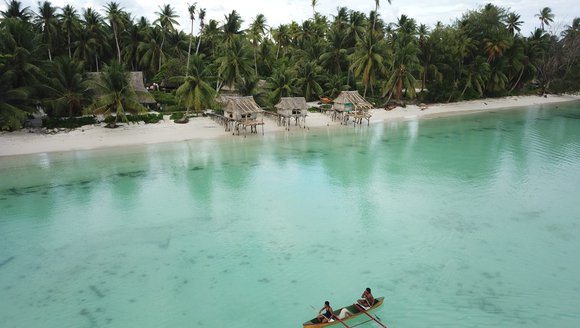Fisheries Strategies for Changing Oceans and Resilient Ecosystems by 2030 (FishSCORE2030)
Contributing to the UN Decade of Ocean Science.
FishSCORE2030 is an endorsed program of the UN Decade of Ocean Science for Sustainable Development. This program is building a global network of scientists, fishing sector members, practitioners, and policy experts that aims to co-develop approaches to sustain marine fisheries, protect ocean ecosystem health, and secure equitable benefits from fisheries in a changing ocean.

Program Goals:
- Build a global network to facilitate information exchange, foster learning, and advance approaches to achieve climate-resilient fisheries.
- Develop information and tools for assessing climate impacts, vulnerabilities, and capacities to enhance resilience in marine fishery systems.
- Apply frameworks and tools in fishery systems around the world to support climate adaptation, and use insights from these experiences to iteratively improve the tools and resources.
- Further the development of scientific foundations and implementation approaches needed to achieve healthy marine ecosystems, vibrant fisheries, and equitable benefits in the context of climate-driven changes in our world’s oceans.
FishSCORE2030
Explore how the FishSCORE2030 program is supporting fisheries around the world.
-
![Climate Change and Fisheries Systems]()
Climate Change and Fisheries Systems
Climate change is causing direct, indirect, and cascading impacts on marine social-ecological systems, including fisheries, with the intensity, frequency, extent, and duration of these impacts …
-
![The FishSCORE2030 Network]()
The FishSCORE2030 Network
The FishSCORE2030 Network is a forum for information exchange about climate-resilient fisheries strategies.
-
![The FishSCORE2030 Approach]()
The FishSCORE2030 Approach
Working in partnership with marine fishery rights-holders and stakeholders around the world, FishSCORE2030 aims to advance climate resilience, sustainability, and equity in marine fisheries through …
-
![Collaborative Projects that Increase Climate Resilience]()
Collaborative Projects that Increase Climate Resilience
FishSCORE2030 aims to facilitate and enhance partnerships in local and regional fisheries around the world to co-develop fishery-specific and context-appropriate climate resilience strategies.
-
![Resources to Support Climate Adaptation in Fisheries]()
Resources to Support Climate Adaptation in Fisheries
Forward-looking assessments of climate resilience require information on how climate risks and vulnerabilities will evolve, their potential impacts on marine ecosystems, communities, and fisheries infrastructure, …
-
![FishSCORE2030 Events]()
FishSCORE2030 Events
Explore and register for upcoming FishSCORE2030 events.
Sign up to be a part of the FishSCORE2030 network!
Join the Network to receive periodic updates on climate resilient fisheries projects and implementation efforts, webinars, and opportunities to participate in workshops and working groups.

Explore the FishSCORE2030 Newsletter
We recently sent out our inaugural FishSCORE2030 newsletter, which includes updates from the network, information on new FishSCORE projects, and more!
Fisheries Strategies for Changing Oceans and Resilient Ecosystems by 2030
Fisheries Strategies for Changing Oceans and Resilient Ecosystems by 2030 (FishSCORE2030) is working to sustain fisheries as a global source of food and jobs, while protecting ocean ecosystem health and enhancing equitable benefits from fisheries. FishSCORE2030 is built on the core principles of inclusivity, equity, and diversity that will inform and strengthen collaborations and partnerships. The program will result in direct outputs such as context-specific climate resilient strategies and synthetic outputs such as science and policy recommendations. A key outcome of the program and the FishSCORE2030 Network will be the development and implementation of practices that increase climate resilience in fisheries while simultaneously increasing the sustainability of marine ecosystems and food systems, and equity and agency of the people and communities that rely on them.

FishSCORE2030 Leadership
Strategic Advisory Board
- Edward Allison
Acting Director Sustainable Aquatic Food Systems, WorldFish - Derek Armitage, PhD
Professor, School of Environment, Resources and Sustainability, University of Waterloo - Mark Dickey-Collas
Independent Applied Marine Scientist - Beth Fulton
CSIRO Australia (Commonwealth Scientific and Industrial Research Organisation), CSIRO Australia, Centre for Marine Socioecology, University of Tasmania - Vivienne Solis Rivera
CoopeSoliDar R.L, MSc., Board Member of ICSF and honorary member of ICCA Consortium - Andrew Rosenberg
MRAG Americas, Inc. - Lynne Shannon, PhD
Research Professor, Department of Biological Sciences, University of Cape Town - Rashid Sumaila
Professor and Canada Research Chair in Interdisciplinary Ocean and Fisheries Economics, Institute for the Oceans and Fisheries, School of Public Policy and Global Affairs, University of British Columbia
FishSCORE Implementation Plan
The FishSCORE2030 Implementation Plan details the program's approach, goals and objectives, and work plan. The plan will be iteratively revised through the decade based on emerging issues, progress, and feedback from our collaborators.









